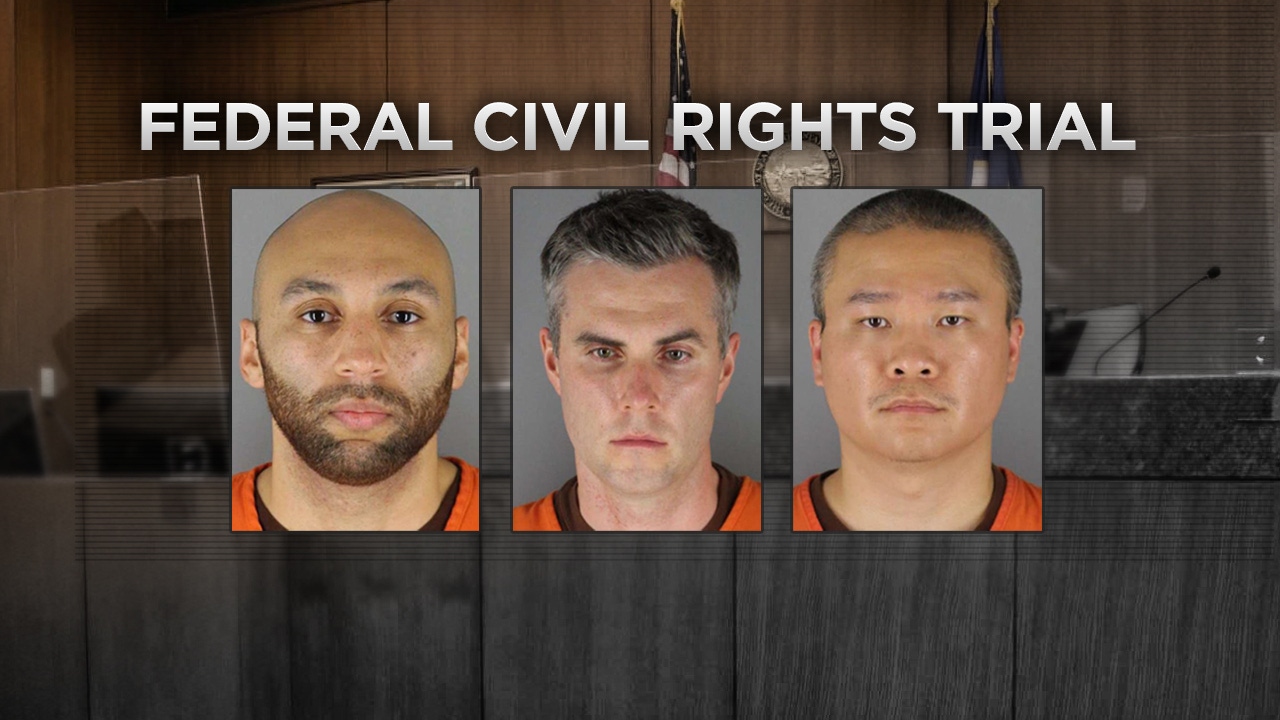Testimony continues Friday in ex-Minneapolis officers’ federal trial
[anvplayer video=”5086143″ station=”998122″]
Testimony has wrapped up Friday on the fifth day of the federal civil rights trial of three former Minneapolis police officers charged in George Floyd’s death: J. Alexander Kueng, Thomas Lane and Tou Thao.
[anvplayer video=”5086225″ station=”998122″]
Court resumes Monday at 9:30 a.m.
3:43-4:25 p.m.
Following a sidebar, Minneapolis Police Inspector Katie Blackwell has returned to the stand.
Tweets by CallanGrayNews2 p.m.
Court has resumed, with Minneapolis Police Inspector Katie Blackwell back on the stand.
Tweets by CallanGrayNews9:30 a.m.- 12:24 p.m.
Minneapolis Police Inspector Katie Blackwell has returned to the stand Friday and testimony began with her going over former officer Thao’s training records.
Blackwell testified that when it comes to use of force, “… everything the officer does is based upon what the subject is doing.”
The prosecution showed a slide to the jury about duty to intervene from training that former officer Thao attended, which read, in capitalized letters on the screen, there is a “DUTY” when an officer is present to stop the application of force when it is no longer required.
Prosecutors, focusing on Thao’s experience, asked Blackwell why officers are repeatedly trained on the “duty to intervene.” Blackwell said, “it’s so critical to their job … they have to do this.”
Prosecutors also touched on Kueng’s and Lane’s work experience. Kueng reportedly started as a community service officer in 2017, then graduated from the Minneapolis Police Academy as a police officer in December 2019, Blackwell said. Lane graduated from the Minneapolis Police Academy, becoming an officer at graduation in December 2019, according to Blackwell.

Blackwell said Lane and Kueng were trained at the Minneapolis Police Academy, where they covered “The Duty To Intervene.” Blackwell explained to jury that includes verbally trying to intervene or physically getting involved in a situation.
When Kueng and Lane attended the Minneapolis Police Academy, Blackwell said recruits went through in-classroom, hands-on practice, and were also put into various field training scenarios.
The prosecution showed Lane’s and Kueng’s tests from the Minneapolis Police Academy that showed that if a sergeant or supervisor is not at scene, that the senior officer who arrives in the first car remains in charge of the scene. Prosecution pointed out Lane and Kueng were the first officers to arrive at the scene where Floyd was, while former Minneapolis police officer Derek Chauvin and Thao arrived later.
Blackwell said the actions of former officers Chauvin, Lane and Kueng were “inconsistent” with Minneapolis Police Department use-of-force policies.
The jury watched Lane’s body camera video of the encounter with Floyd. Blackwell was asked about what played out on video and said once Floyd was not actively resisting on the ground, he should have been moved to “side-recovery” position.
Court is in recess until later in the afternoon.
Tweets by EricChalouxKSTPTestimony is continuing for the fifth day in the federal trial of three former Minneapolis police officers—Thomas Lane, J. Alexander Kueng and Tou Thao— who are charged with violating George Floyd’s civil rights.
Minneapolis Police Inspector Katie Blackwell is expected to return to the stand Friday after testifying for much of the day Thursday.
RELATED: MPD inspector, doctor who treated Floyd take stand in 3 officers’ federal trial
Blackwell was the commander in charge of running the Minneapolis Police Department’s training division in May 2020, and told the jury officers have the duty to intervene to stop inappropriate force and to provide medical assistance.
Whether the officers deprived Floyd of medical aid is a key element of this case, and prosecutors have sought to show jurors that responding paramedics were not given important information, and that Floyd should have been given medical attention immediately.
Meanwhile, a doctor who treated Floyd at the hospital also took the stand Thursday.
Dr. Bradford Wankhede Langenfeld treated Floyd when he arrived at HCMC, unresponsive.
Langenfeld says medical staff immediately started working to resuscitate him and to determine the cause of his cardiac arrest.
Langenfeld told jurors he believed the two more likely causes of Floyd’s cardiac arrest could’ve been mechanical asphyxia or excited delirium. Langenfeld later clarified to jurors that excited delirium is a controversial diagnosis and he did not have information that suggested a state of severe agitation.
Defense attorneys also cross-examined the doctor.
Lane’s attorney, Earl Gray, asked “If an individual had consumed methamphetamine and fentanyl during a physical contact with individuals and actually struggling extremely hard, is that something that could end up killing them?”
Langenfeld told the jury it could, but also said he defers to the medical examiner for cause of death.
Court resumes 9:30 a.m. Friday.
This is a developing story. 5 EYEWITNESS NEWS will continue to update it throughout the day as the trial proceeds.